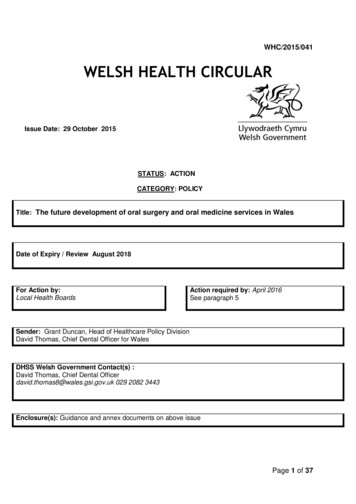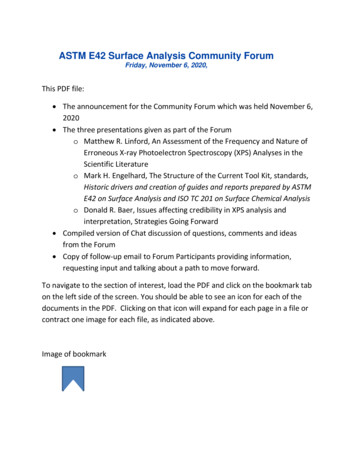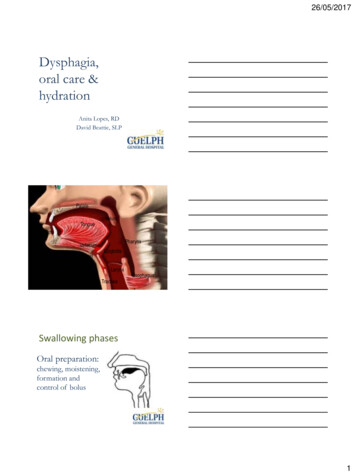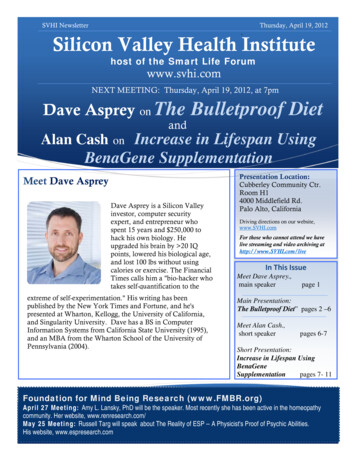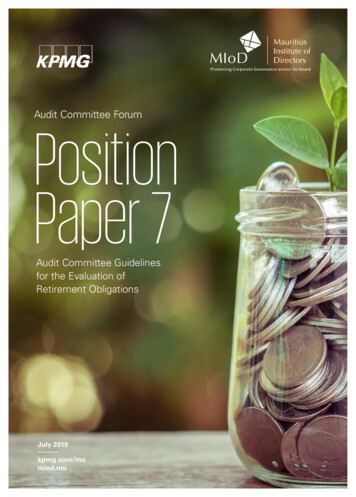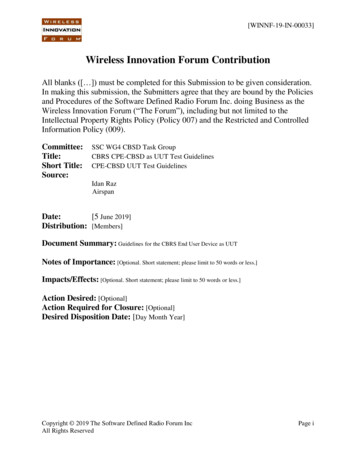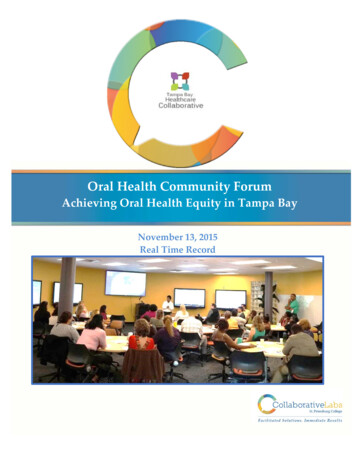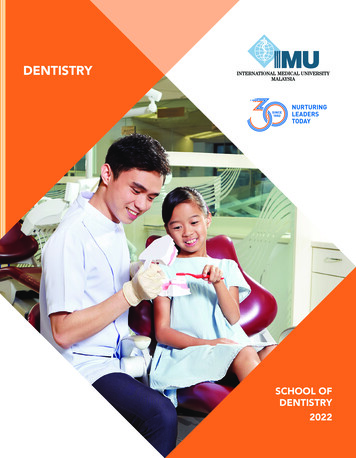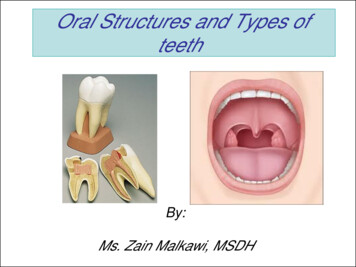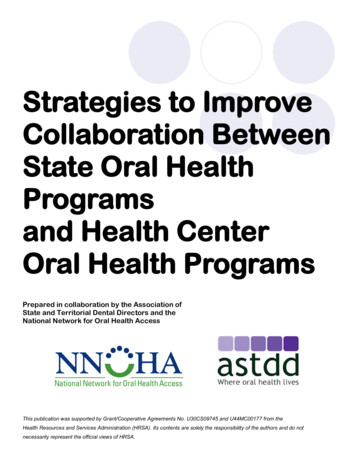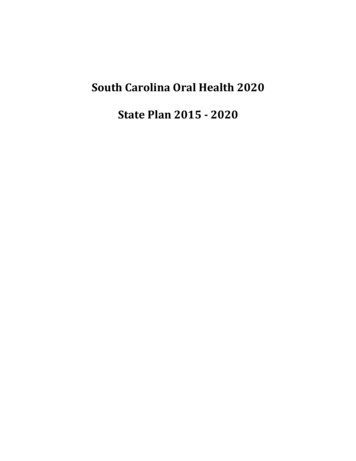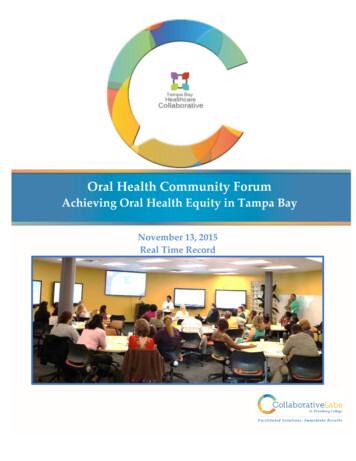
Transcription
Oral Health Community ForumAchieving Oral Health Equity in Tampa BayNovember 13, 2015Real Time Record
Oral Health Community ForumNovember 13, 2015Table of ContentsWarm-Up Activity: Capture one or more “Oral Health Best Practices” .5Welcome and Introductions “Oral Health Best Practice” Sharing .7Understanding the Context . 12The State of Oral Health in Florida . 18Five Whys Activity . 26Why doesn’t Jesse have a Dentist? – Team Brainstorming . 28Root Causes – Team Reports . 32Top 3 Root Causes . 35Overview and Preliminary Findings . 36Lunch and Discussion in Workgroups . 38Next Steps & Champions . 39Workgroup Debrief and Wrap-up . 41Appendix – Sign-in Sheets . 42CollaborativeLabs@spcollege.edu2
Oral Health Community ForumNovember 13, 2015Oral Health Community ForumCollaborative Labs at St. Petersburg CollegeNovember 13, 20158:30 AM – 1:30 PMAGENDADesired Outcomes Increased understanding of oral health and its importance Improved knowledge of local oral health concerns and complications Enhanced awareness of health disparities and the need to achieve oral healthequity Expanded network of oral health partners compelled to take action8:30 AM – 9:00 AMSign-in & NetworkingWarm-Up Activity: Capture one or more “Oral Health Best Practices” Advocacy Communications/Marketing Programs/Services Collaborations9:00 AM – 9:30 AMWelcome and Introductions “Oral Health Best Practice” SharingMarissa Davis, Program Coordinator, Tampa Bay Healthcare CollaborativeAndrea Henning, Executive Director, Collaborative Labs9:30 AM – 10:00 AMUnderstanding the ContextCarrie Hepburn, Executive Director, Tampa Bay Healthcare CollaborativeMichael Monopoli, Vice President, Foundation ProgramsDentaQuest FoundationAndrew Bishop, Grants & Program Associate, DentaQuest Foundation10:00 AM – 10:45 AMThe State of Oral Health in FloridaRoderick King, President/CEO, Florida Institute for Health Innovation, Inc.11:00 AM – 11:50 AMFive Whys ActivitySmall Group Activity and Facilitated Discussion – understand barriers/gaps11:50 AM – 12:20 PMOverview and Preliminary FindingsMarissa Davis, Program Coordinator, Tampa Bay Healthcare Collaborative12:20 PM – 1:00 PMLunch and Discussion in WorkgroupsSelect a spokesperson to report back to the group1:00 PM – 1:30 PMWorkgroup Debrief and Wrap-upCollaborativeLabs@spcollege.edu3
Oral Health Community ForumNovember 13, 2015Achieving Oral Health Equity (AOHE) in Tampa BayAs part of the Oral Health 2020 Vision, the Collaborative is working toward significant systemsand public policy change and to create new social norms around oral health. As part of thiseffort, TBHC is interested in better understanding the community’s current attitudes,perspectives, and beliefs. Through grassroots community outreach and in partnership withexisting efforts, TBHC is striving to reduce oral health disparities and improve oral healthoutcomes.AOHE Initiative Goals Build a network of community stakeholders committed to achieving oral health equityConduct a regional community assessment regarding oral health and identify gapsCatalog existing oral health services, programs and resourcesPromote and improve the public perception on the value of good oral healthCommunicate the importance of interprofessional education and integrated careAOHE Proposed WorkgroupsPurpose: To leverage current efforts to address and improve community oral health whilefocusing on existing health disparities.Desired Outcomes Create an opportunity for stakeholders to work together to produce actionable plans thatreflect consensus and address identified community needs Expand the network of stakeholders committed to achieving oral health equity Increase the communities’ ability to impact public policy and create systems changeAdvocacy/Policy Workgroup Monitor oral health and related legislation to identify advocacy opportunities Develop recommendations to increase awareness of existing policies positively impactingoral health accessCommunications/Marketing Workgroup Develop key messages to promote the value of good oral health and its connectedness tooverall health in a way which will resonate with the community Identify opportunities to promote and share key messagesProgram and Services Workgroup Compile information about existing oral health services to create a resource guide/database Identify opportunities to increase service coordination among existing oral health programsand servicesCollaborativeLabs@spcollege.edu4
Oral Health Community Forum November 13, 2015Warm-Up Activity: Capture one or more “Oral Health Best ms/ServicesCollaborationsOral Health – Advocacy Best Practices Advocacy Best PracticesIncrease MedicaidReimbursement rates & expandcoverage to include adultpreventive & restorative careOral Health – Communication/Marketing Best PracticesCommunication/Marketing Best Practices Social Media Join PCOHC Education & MessagingCommittee Flyers for the community (word ofmouth) Share with others where we havehad good dental experiences(catalog – Dr. Yoho – Hills CountyTampa Families Dental) Outreach through schools & otherorganizations On-site educationCollaborativeLabs@spcollege.edu5
Oral Health Community ForumNovember 13, 2015Oral Health – Programs/Services Best Practices Programs/Services Best PracticesMMU – Mobile Medical UnitPinellas County Health ProgramAEFAP – Adult Emergency FinancialAssistance Program – 211Affordable Health Services – patientDentistsCommunicate with PCOHC Access toCare & Prevention CommitteesIntegrating & being mindful oralhealth into all aspects (holistic care)of a person’s life (i.e. ability to chew,denture care, hygiene, etc.)Continue making linkagesASAP & Pinellas Care Clinic – servingHIV/AIDS infected personsPasco State College Dental ClinicOral Health – Collaboration CollaborativeLabs@spcollege.edu6Collaboration Best PracticesPartner with Pinellas Oral HealthCoalitionPartner with dental college clinicsParticipate at eventsOutreach through schools & otherorganizationsFAFCC – Florida Association of Free& Charitable ClinicsNetworking Opportunities
Oral Health Community ForumNovember 13, 2015Welcome and Introductions “Oral Health Best Practice” SharingMarissa Davis, Program Coordinator, Tampa Bay Healthcare CollaborativeAndrea Henning, Executive Director, Collaborative LabsMarissa Davis, Program Coordinator, Tampa Bay HealthcareCollaborative: Good morning! We’re going to start off today by showing you ashort clip from the DentaQuest Foundation. It’s a good representation of ourpartnership with them.A short oral health video was played.Marissa: Did you guys like the video? I want to welcome you all again! I recognize some ofyour faces from working in the community. For everyone else, I look forward to getting to knowyou better and finding out ways to work together. I hope you leave today with the outcomesthat are listed on the agenda. I hope you consider these three questions – where are we now,where do we want to be, and how can we get there together? What goals can we think of on anational, state and local level that will drive this movement toward achieving oral health? Whereare we now? What does the landscape look like? What barriers exist on the ground right now ifsomeone is trying to access dental services? How can we work as a team compelled to takeaction to achieve oral health equity? If we think of those three questions and have increasedknowledge, I think we’ll have a great day as we move through the agenda. At this time, I’d liketo acknowledge and hear the voice of everyone in this room and do introductions. If you sharedsomething on the white board, we’ll ask you to share that as well.Andrea Henning, Executive Director, Collaborative Labs, St. PetersburgCollege: Welcome! It’s good to have you! I think you’re really going to enjoy theprocess today. Marissa really has a passion for this initiative. You’re champions ofthis effort this morning! Looking at the whiteboards of best practices, we do nothave a blank slate. When you introduce yourself and organization, please sharesomething that we are already doing well.CollaborativeLabs@spcollege.edu7
Oral Health Community ForumNovember 13, 2015The participants introduced themselves.Cindy McNulty, Community Liaison, Healthy Start Coalition of Pinellas: Iam also a board member for Community Health Centers, and board member ofthe Pinellas County Oral Health Coalition (PCHA). We have a lot of strategies toshare! We would like to talk to legislators about increasing Medicaidreimbursement rates, expand coverage to include adults, join a committee –although they could probably be merged, and communicate the outcomes of today with thePCHA.Michelle Schaefer, Fetal and Infant Mortality Review (FIMR)Coordinator, Healthy Start of Pinellas: Try to enroll people in the affordabledental plans in the marketplace, but it’s not that easy. Many people don’t think it’simportant. If adults don’t think it’s important then they’re not going to think it’simportant for their children. We would like to let them know what is out there thatis completely free like the Dunedin event that’s coming up and refer them out ifthey don’t want to pay for dental on the marketplace. It’s challenging to not only have thehealth conversation but also the dental – it’s overwhelming, especially for those who have neverhad health insurance before.Santra Denis, Community Health Services Director, Catalyst Miami: Weare a grassroots organization in Miami-Dade County funded through DentaQuestas well. One of the things that is important for me is to get the information fromthe top down, and getting communities to talk about equity. A lot of people thinkthere situation is unique to them. The more people realize there are inequities inoral health and it’s not just because you’re a certain color or from a certain community that youshouldn’t have healthcare. People should get upset and demand that their Representatives dosomething about it. We want to get information to community members – we want to bringpressure to make the things happen.Jeremy Westmass, Coordinator, Seniors in Services: With our population,we have a lot of senior volunteers. You came as guest speaker so you were ableto educate a lot of our volunteers. The collaboration is excellent.Glarisol Traspalacios, Manager, Seniors in Service: We recruit, train andplace volunteers over fifty-five to assist people in their homes, mostly homebound, disabled, older adults. We are looking for other agencies where we canrefer our clients or volunteers.Ariel Landry, Metropolitan Ministries: We are in Hillsborough County and weare expanding into Pasco County. We help holistically empower homeless people.Part of the piece we were missing was the health aspect. I am the health andwellness coordinator, creating initiatives for our residents, outreach communitymembers, and for our staff. I’m here to learn from you and see if there are wayswe can partner with you so we can help further this initiative.CollaborativeLabs@spcollege.edu8
Oral Health Community ForumNovember 13, 2015Theresa White, Director of Dental Services, Homeless EmpowermentProgram: We are a homeless shelter where we provide food, clothing andsupportive programs for the homeless. One of those programs is a free dentalclinic that we have onsite. We work with volunteer dentists and dental hygienists.I am a recent board member of the Florida Association of Free Charitable Clinics(FACC). It’s a great way to network and they also help with grants and funding.Dina Howell, Dentist, Tampa Family Health Centers: We have mobileclinics and we go to schools and the WIC programs. We work with pregnantwomen to share how dental health is important so when they have their baby,they already know the best practices and teach their child how to brush, so wedon’t have the issues later on. Networking – this is going to be a great day –because there’s not a lot of things going on for the senior population.Jane Walker, Daystar Life Center, Inc.: We are located in St. Petersburg butwe serve Pinellas County. We provide basic needs assistance to individuals whoneed clothes, transportation, and identification – everything we need as humanbeings to survive. We work with people who don’t have access to what theyneed. I am also reminded at how slow I can be because over the years; I haven’trealized what impacts people’s lives. Twenty years ago, I was feeding thehomeless and no one was eating the apples. A homeless man smiled and didn’t have any teeth.We see the aging, dentures, mouth changes, not being able to chew and how that affects yourhealth. We’ve always provided toothpaste but not denture cleaner. Why did it take me so longto figure this out? We want to be mindful of these things. As we talk about food, health andhygiene and how all these are related is a more holistic approach.Artie Fryer, Hillsborough County Health Care Services: I’m here to getacquainted with some of the issues and I look forward to what goes on today.Vernon Bryant, Great Ridgecrest YMCA: One of the pillars of the YMCA ishealthy living. We want to partner with and encourage people to have healthierlives – not just exercise. I think we should increase our use of social media. The Yhas lots of events and we have partners come out and talk about what they do.As an example, we were giving out Halloween candy and Marissa was theretalking about oral health. Also, we need to continue our outreach through schoolsand other organizations, and I want to give access to this information in mycommunity.Bernadine “Lynn” Hall, Gatekeeper for Various Volunteer Organizations:I brought some people with me – Matilda, Jasmine, Correlle, Tyrone, Linda,Shirley. I do all the flyers and I try to bring information to the community.Anything you can do for the parents or kids – any time you have an event – I canget you a group – I’m pretty persistent in what I do. I need a contact and a bus tohelp elderly people to get to the dentist.CollaborativeLabs@spcollege.edu9
Oral Health Community ForumNovember 13, 2015Erin Baird, Allegany Franciscan Ministries: We fund the Collaborative andwe fund access to health and oral health support systems.Susan Easter, St. Petersburg Free Clinic: Thanks to Allegany FranciscanMinistries that the St. Pete Free Clinic has a dental program. We treat adults agethirty-eight to sixty-four who do not have healthcare or dental insurance. Weprovide them with hygiene, fillings, and extractions. We never run out of patients.We are in downtown St. Pete and you must live in Pinellas County to use ourservices.Lourdes Benedict, Director, Pinellas County Human Services: One of ourstrengths is the MMU or Mobile Medical Unit and it goes to different locations inSt. Petersburg. There’s a calendar on the Pinellas County home page to servehomeless individuals and their healthcare needs. We also have the Pinellas CountyHealth Program to serve the low income population, and we are partnering withthe Pinellas County Health Department. They do all of the physical health andDirections for the Living for our behavioral health. The AEFAP, the Adult Emergency FinancialAssistance Program or 211 – the Board of County Commissioners funded two million dollars tohelp folks in the community with a one-time emergency. This is a program for adults in PinellasCounty. The Board also supports the sealant program. At the end of the year, we had aboutseventy folks who have dentures because of this program. We love to hear their success storiesin how they feel now that they have dentures.Daisy Rodriguez, Healthcare Administrator, Pinellas County HumanServices: I’m brand new – I’ve been here about two months from New York. I’mlooking forward to learning from all of you, networking with you, and learningabout what some of the gaps are to serve the community a lot better.Dawn Hulton, Impact Health: Our HIV/AIDS Service Association of Pinellas incollaboration with the Pinellas Care Clinic, is opening a medical home for peoplewith HIV/AIDS. The renovations are being finalized. We don’t have a dentalcomponent. ASAP and Pinellas Care Clinic does the medical with HIV/AIDSindividuals.Maybelline Samiel, Baycare Health System: We are here focusing on thePasco County population. Sharon and I co-wrote a grant – saw a need for peoplewho come into the emergency room with dental issues. We are going tocollaborate with the Pasco State College Dental Clinic and hopefully have an ERdiversion program for services they could perform.CollaborativeLabs@spcollege.edu10
Oral Health Community ForumNovember 13, 2015Christine Hom, Project Manager, Florida Institute for Health Innovationand Project Manager, Oral Health Alliance: We are a statewide organizationand we are looking at children’s oral health outcomes.Roderick King, President/CEO, Florida Institute for Health Innovation,Inc.: I’ll say more about my background shortly.Michael Monopoli, Vice President, Foundation Programs, DentaQuestFoundation: We are a national foundation focused solely on improving oralhealth.Andrew Bishop, Grants & Program Associate, DentaQuest Foundation:You’ll hear from us in a little bit.Terrence, Tampa Bay Healthcare Collaborative: work with Marissa to help herdo what she does betterMarissa: Thank you for sharing your best practices and introducing yourselves. I want to nowintroduce Carrie Hepburn.CollaborativeLabs@spcollege.edu11
Oral Health Community ForumNovember 13, 2015Understanding the ContextCarrie Hepburn, Executive Director, Tampa Bay Healthcare CollaborativeMichael Monopoli, Vice President, Foundation Programs, DentaQuest FoundationAndrew Bishop, Grants & Program Associate, DentaQuest FoundationCarrie Hepburn, Executive Director, Tampa Bay HealthcareCollaborative: Good morning everybody! The Collaborative is all aboutrelationships. We have been on this journey for eight months and we are all aboutleveraging what is already existing and recognizing the work that is going on. Wedon’t want to duplicate work but take what is existing and expand it. I attended aFPHA in Orlando. They were hosting a regional discussion about health equity. Imet Christine Hom there who was trying to connect me with Michael Monopoli. Mike and Iconnected and it turns out they had this great opportunity to expand the oral health networkand increase oral health access by the year 2020. The Collaborative is member driven andmember led. We took the opportunity to our health equity committee and they agreed it was agood idea. Marissa applied for a program manager position we had available – which is nowfilled by Lori James – and I told her I am in the middle of submitting a grant that we willprobably get funded for. Would you like to be program coordinator for this program? I don’thave a job description. She agreed to jump onto the plane as it was still being built and she’sbecome a wonderful ambassador! I get to see her blossom which is really great! I also want totell you about Roderick King and Christine Hom with FIHI and Santra Denis with Catalyst Miami.They are so committed to our cause that they are came up from South Florida to be here withus today. And last but certainly not least, our partners at DentaQuest, who reside in Boston, andflew here to be with us today as well. It has beena great pleasure to get to know Mike and Andrewand to help us move this oral health initiativeforward.We have a selfie stick going around. Please takepictures. This is a huge event for us! We havebranded this initiative so you will see thisemblem with “Achieving Oral Health Equity.”We’re excited for the opportunity and to moveforward the work as we continue to fosterrelationships, build organizational capacity, andpromote access to health and healthcareservices. I would now like to introduce Mike Monopoli with DentaQuest Foundation.CollaborativeLabs@spcollege.edu12
Oral Health Community ForumNovember 13, 2015Michael Monopoli, VicePresident, FoundationPrograms, DentaQuestFoundation: Thank you, Carrie.It’s amazing to be in this roomand hear about all the work thathas been happening. People are often not able toachieve their most optimal health and don’t haveaccess to care. We feel strongly that oral health isa component of health. I’d like to give you a briefoverview of what we do and how we’ve beenthinking about including oral health in the workthat everyone else is doing already.It’s not really a system – it’s so fragmented fromthe rest of the healthcare system. Systems ofcare are designed to create what needs tohappen and are created by themselves. We havesystems of oral care and we see people do nothave access to care. You can see the outcomes ofthe system we have now and it is a system that isfailing. The lines of people you see are from aMission of Mercy event done across the countryfor people who have not have any access to oralhealth care. These are mostly adults and they lineup overnight to get access to care for one day.The picture of the boy shown is a child who diedfrom a dental infection in Maryland. No one shouldhave to wait overnight for one day of care or dieof dental disease. We can use charity and we canget around some of these issues but we want tocreate a true system of care. Charity is not asystem of care. We want to look at the system andsee how we can change them to be moreeffective. We want to add oral health to the mix.Oral health is a social justice issue. We have towork with everyone and we need to get togetherto fix it. Everyone should have the sameopportunity to live a healthy life. If you don’t haveoral health then you’re not healthy. We want to bring people together to mobilize and changethis. We know exactly how to prevent this disease, we’re just not doing it.CollaborativeLabs@spcollege.edu13
Oral Health Community ForumNovember 13, 2015Michael: Health equity needs to be a priority.We need to make this an issue when we’retalking about oral health. Engaging a diversepopulation is important but this doesn’t equalhealth equity. Everyone should have an equalopportunity to have good health. You have tolook specifically at what’s happening in a specificpopulation to really understand the situation. Ifyou give everyone the same amount ofresources, it won’t work. We need to provide theresources to create the equity for differentpopulations in the group.If you want to achieve healthequity, we really need to impactthe system. It’s very resilient,good at maintaining status quo,and fighting against change. Toreally make an impact, we haveto work together. At theDentaQuest Foundation, wehave a plan of how we can dothat. We need to look atfragmentation and see wherewe can create the changes tothe system. We’ve been workingaround the country to see howwe can network to worktogether. Through socialnetworking and platforms, we can create connectivity. Once we have connectivity, we can alignourselves together. After the alignment, we can create action to make changes. We started bycreating a network of people working on oral health issues who are state or regional-based.We’re call them the grass middles network. We are also brought together national partners –referred to as grass tops. We recognized the need to have those most impacted by the issue,the community, a part of the network as well – the grassroots organizations. This is what weneed to do and this is what we need to change. We are doing all of this because it is a socialjustice issue. As a philanthropy organization, our role is to bring people together and help findthe resources to implement the right solutions.CollaborativeLabs@spcollege.edu14
Oral Health Community ForumNovember 13, 2015Andrew Bishop, Grants & Program Associate, DentaQuest FoundationIt is so good to be in St. Petersburg from Boston. It’s beautiful here. We’ve beentalking about things at a high level. What I want to do is really drill it down to whywe’re in this room. As Mike said, only through a robust national network can wecome up with solutions to fix large-scale systems-level problems that are going toaffect long-lasting change. What does systems transformation actually look like inthe context of oral health? Systems problems affect people very much in a personal and directway. Later today, we will look at root causes in the systems change framework and how theyplay out.On this slide, you see the varioussystems that surround oral health –Policy, Financing, Care, andCommunity. I’ll touch on each onebriefly. For policy, oral health is anessential component of healthpolicy. For care, how do we ensurethat adequate care is delivered in away that is open, welcoming andinviting and is based on evidence,prevention, and outcome? It’smaking sure that we are servingthe whole person that is walkinginto the various access care points.Conversely to that, we look atfinancing, making sure that themechanisms to finance care are inplace so that we are paying for the outcomes and quality of care we receive, not just how manyprocedures our doctors or dentists are doing on us. We should be paying for quality notquantity. Finally, probably the most important fundamental system is really community, whatwe’re doing in this room today. That’s ensuring that communities have the tools and resourcesto really support the overall health and well-being of their residents. Systems-level problems andthe inequities that result from these broken systems are affecting all of us, every day people,every day.CollaborativeLabs@spcollege.edu15
Oral Health Community ForumNovember 13, 2015The network that developed thesystem change framework alsodeveloped these goals on how weare going to get to what that perfectsystem looks like. These goals andtargets, built by the network, take alifespan approach to improving oralhealth. Each of these six goals has aspecific target we hope to reach bythe year 2020. For the sake of time,I’m going to focus on the one goalthat brings us into this room today –improving the public perception ofthe value of oral health with a targetthat oral health is increasinglyincluded in our health dialogue andpublic policy.The best way to talk about this networkinvestment strategy and why theFoundation is putting resources aroundthis important topic is to really tell youabout the Grassroots EngagementStrategy that the network is currentlypursuing. The core behind this idea is toengage broad networks of communitybased organizations, residents – thepeople that live in those communities,and diverse stakeholders across thosecommunities that have the power tocome together to collectively amplify thevoice of the people who are mostaffected when the existing systems fail –the people who are experiencing oralhealth inequities. Then we want to take what we are learning and weave this perspective acrossthe network – we don’t want to hear what experts think communities need, but listen to peoplein the community of what we need to be healthy. It has to be grassroots and led by the peopleon the ground. It really is fundamental for guiding and forming the network strategy aroundimproving the public perception, creating those new social norms about being healthy thatincludes oral health, and thenreally how we change the systems thatare creating the negativehealth outcomes.CollaborativeLabs@spcollege.edu16
Oral Health Community ForumNovember 13, 2015Investments from the foundation are enablingtwenty local communities in six states. Withthese investments, we are focused on enablinggrassroots organizations to expand their scopeto include oral health. Some of thesecommunity organizations are new to oralhealth and the idea is to expand their scope,engage their constituents on oral health as asocial justice issue, and then start that changeprocess of the public perception of the realvalue in oral health. The reason we chosethese six states is because of the communityorganizations that have the grassroots effortsso you will hear from Dr. King who isone of our grassroots partners fromFlorida as well as Christine Hom who isfrom Florida Institute for HealthInnovation. We can provide themresources to get going, knowledge ofthe landscape, and help drive some oftheir work forward that has to be doneat the state level.Through the Foundation and the 2020network, we had some initial ideas onwhat a grassroots engagement strategylooked like but we realized that wasfrom our perspective and that was notthe entire picture. What emerged froma national convening of all theorganizations from six states with members of theorganizations was the initial three years of a strategymap of what it would take to authentically engagecommunity organizations. We need the actualcommunity organizations to take ownership of theoral health issue. This first year, we’re learning,assessing and planning. In year two, we want toengage, empower and equip and determine how wecan get people inspired. In year three, we want totake action in the community and the network.This is really going to help align us with theimportance of oral health in our communities. Thism
DentaQuest Foundation Andrew Bishop, Grants & Program Associate, DentaQuest Foundation 10:00 AM – 10:45 AM The State of Oral Health in Florida Roderick King, President/CEO, Florida Institute for Health Innovation, Inc. 11:00 AM – 11:50 AM Five Whys Activity Small Group Activ
